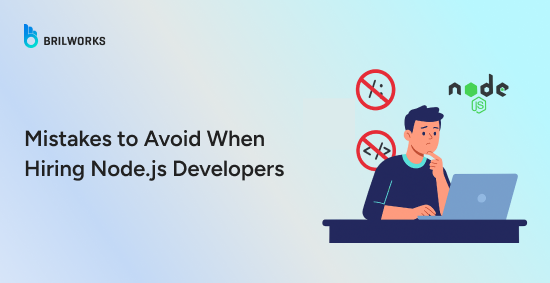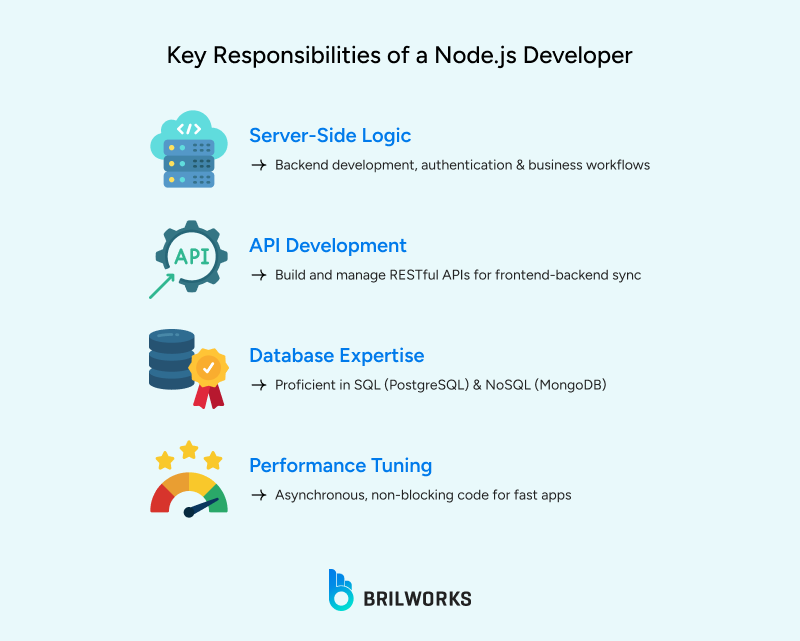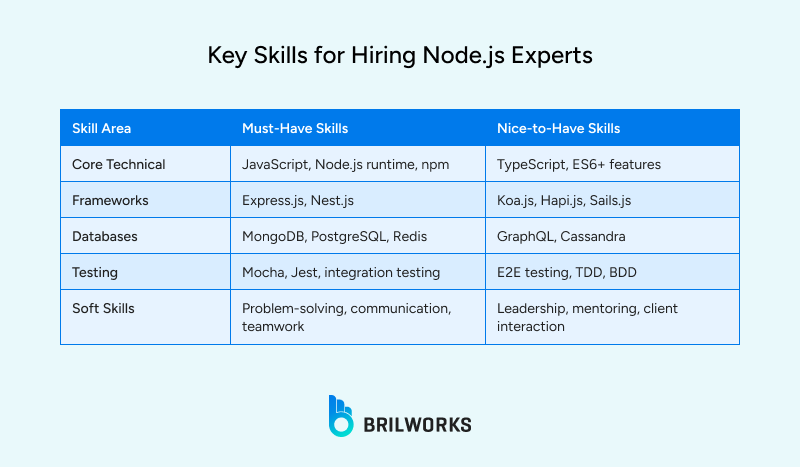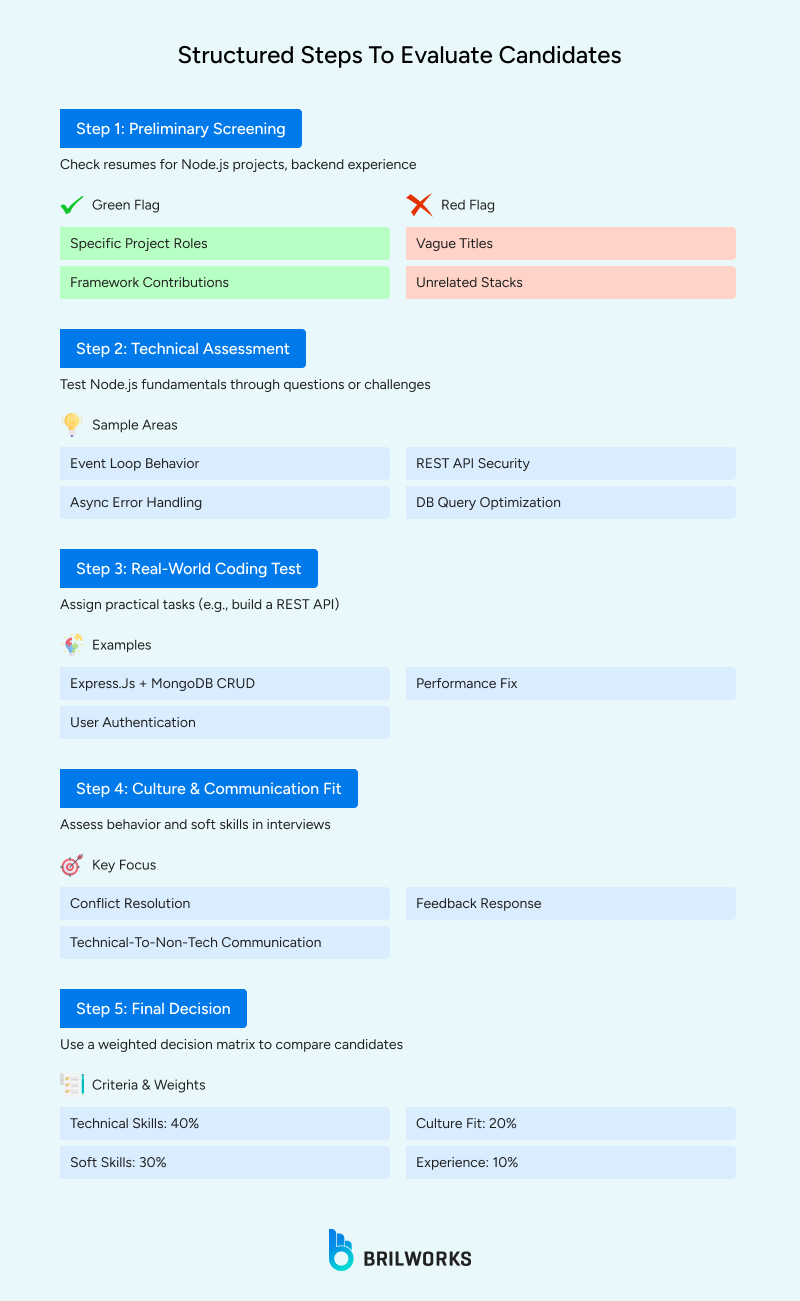COOPERATION MODEL
ARTIFICIAL INTELLIGENCE
PRODUCT ENGINEERING
DevOps & Cloud
LOW-CODE/NO-CODE DEVELOPMENT
INDUSTRY
FRONTEND DEVELOPMENT
CLOUD DEVELOPMENT
MOBILE APP DEVELOPMENT
LOW CODE/ NO CODE DEVELOPMENT
EMERGING TECHNOLOGIES








If Node.js is at the center of your development, make sure the professionals building it know what they're doing. This guide takes a closer look at the hiring traps teams often fall into, and how to avoid them.
Node.js has quietly become one of the hottest tools in backend development. In 2025, it remains among the top three technologies used by working developers. The event-driven architecture and its ability to manage concurrent requests without blocking have made it an incredibly reliable choice for everything ranging from chat applications to backend systems. The tens of thousands of Node.js roles being posted by mid-sized companies and large technology firms obscure the fact that hiring expert node professionals is harder than it seems.
In 2025, Node.js developers will remain in steady demand. In the USA, on average, NodeJS hiring costs range from $100K to $155K. Freelance development is cost-effective, costing between $50–$120/hour, depending on expertise and location.
Many companies exploring offshore options find skilled developers in Eastern Europe and South Asia at more moderate rates, usually around $30–$60/hour, without compromising on code quality. At the same time, market data suggests a 9–16% dip in average developer rates this year, partly driven by increased productivity from AI tooling and flatter demand curves (Source). These shifts are subtle but meaningful, especially when hiring decisions impact both short-term delivery and long-term product architecture.
We've written extensively on Node.js, from architecture best practices to hiring insights. Still, one issue keeps surfacing: hiring errors that slow down teams, stretch budgets, or compromise output. Before you start screening candidates, it's worth looking at the common traps companies walk into.

When putting together a Nodejs team, it's important to be clear on the skills necessary for success. Those skills reach across five major categories: core technical skills, framework skills, database skills, testing skills, and soft skills.

JavaScript proficiency: Node.js is founded and built using JavaScript. Without a foundation developed in JavaScript developers will face difficulty with async patterns, event driven flows, and error handling.
Framework expertise: Understanding when and how to implement frameworks such as Express.js or Nest.js will promote development velocity and maintainability.
Database handling: Backend systems must move data efficiently. Experience with MongoDB or Redis translates to better performance and cleaner architecture.
Testing knowledge: Reliable code means fewer bugs, smoother handoffs, and confidence during deployments.
Soft skills: In distributed or cross-functional teams, technical skill alone isn't enough. Communication, adaptability, and collaboration are vital.
If you're unsure what depth of skill your project demands, consider pairing a short-term consultant with your in-house team. This allows early technical decisions to be validated before making full-time hiring commitments.
To reduce mis-hires, companies need a deliberate evaluation process. Here's a 5-step structure you can adapt based on the complexity of your project.
Start by checking resumes and portfolios. While reviewing, you must focus on:
Green flags: Concrete project contributions, clarity on the tools used (E.g. Express.js), backend ownership, and public GitHub contributions.
Red flags: Generalist titles ("Web Developer"), shallow mentions of Node.js or tech stacks that weren't backend focused.
You're not just testing for syntax, you're testing for depth. Look at the fundamentals of this topic in these question areas:
What is the event loop and how does it affect scalability?
How do you catch errors in async code?
How would you secure a REST API using Express?
What's the difference between process.nextTick() and setImmediate()?
How would you approach query optimization for PostgreSQL or MongoDB?
These types of questions go beyond theory and highlight real-world understanding of Node.js behavior under pressure.
Practical assignments reveal far more than textbook answers. Task examples include:
Build a basic CRUD API with Express.js and MongoDB.
Add JWT-based authentication and role permissions.
Refactor a poorly performing endpoint for speed.
The goal isn't to test every line—they should demonstrate how they approach structure, error handling, and performance.
Node.js developers often work alongside frontend engineers, QA, and PMs. In behavioral interviews, focus on:
Team conflict resolution
Explaining technical topics to non-technical peers
Willingness to receive and act on feedback
Soft skills matter even more in remote or hybrid teams.

The problem: Vague job descriptions attract the wrong candidates.
Fix it: Specify the tools and workflows—e.g., "building REST APIs with Express.js," or "working with MongoDB and Redis in production."
The problem: Great resumes don't guarantee great jobs.
Fix it: Give real-world assignments that test async work, API dev, or data manipulation under real-world constraints.
The problem: Miscommunication leads to misalignment of expectations, delayed QA cycles, and product delivery.
Fix it: Ask situational questions that test collaboration and feedback handling.
The problem: Choosing the lowest bidder often results in poorly written code, higher refactoring costs, and technical debt.
Fix it: Focus on long-term value, not hourly rates.
The problem: Developers may mishandle sensitive data or IP if not contractually protected.
Fix it: Use strong NDAs, clear IP clauses, and proper access management.
The problem: Even skilled developers can fail in team environments if values and work styles don't align.
Fix it: Involve peers in interviews and assess for shared collaboration norms.
The problem: Developers with outdated skills or no curiosity may fall behind as the Node.js ecosystem evolves.
Fix it: Look for ongoing learning, open-source activity, and awareness of tools like TypeScript, GraphQL, or CI/CD.
When working with external or remote Node.js developers, securing your codebase and IP is non-negotiable. Here's what to implement:
Contracts: Include clauses covering IP ownership, non-disclosure, and confidentiality.
Access control: Restrict access using RBAC (Role-Based Access Control) via GitHub, GitLab, or CI/CD pipelines.
Security practices: Enforce Node.js security practices such as sanitizing inputs, avoiding hardcoded credentials, and secure session handling.
Monitoring: Track activity with tools like Sentry, Git logs, or container logs to identify suspicious behavior.
These steps protect your intellectual property and ensure compliance with internal security protocols.
The Node.js ecosystem is changing fast. Future-proofing is not just about hiring great developers, it is about embedding learning habits into your culture.
Continuous learning: Support learning through Node.js workshops, Pluralsight, Udemy, or internal tech talks.
Update discipline: Avoid outdated stacks by regularly upgrading dependencies and minimizing technical debt.
Documentation culture: Encourage clear, up-to-date documentation to ease onboarding and cross-team collaboration.
Ecosystem awareness: Stay current with Node.js release notes and emerging practices in modern JavaScript development.
Teams that stay current ship faster and adapt better to shifting tech trends.
The right Node.js developers do more than write code, they scale systems, stabilize products, and bring architectural foresight to your team. A structured hiring process, clear role definition, and attention to team dynamics can help you avoid common traps and build faster with fewer blockers.
Brilworks helps companies build Node.js teams that last. From vetting top-tier developers to aligning with your technical goals, we've helped startups and enterprises alike strengthen their backend foundations. Need help building your Node.js team? Hire Node.js Developers.
Tools like GitHub, Slack, Jira, and Notion support code reviews, async discussions, and sprint tracking across distributed teams.
Ask for real-world examples or assign scenarios like debugging memory leaks or optimizing I/O-intensive endpoints.
Freelancers typically charge $50–150/hour. Full-time salaries range from $80K–150K/year depending on region and experience. Freelance is better for short-term needs; full-time offers stability for long-term products.
Get In Touch
Contact us for your software development requirements
Get In Touch
Contact us for your software development requirements